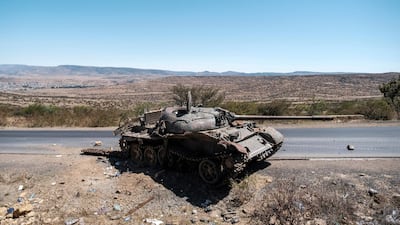An international conflict has long been brewing in East Africa, averted thus far only through careful diplomacy. As civil strife intensifies in Ethiopia, so does the possibility of a dispute along that country's border with Sudan. Addis Ababa plans to go ahead in July with a second stage of filling the reservoir behind the Grand Ethiopia Renaissance Dam, a huge project on the Nile that will transform Ethiopia's energy landscape and provide a unifying boost to its national economy, though at the expense of water security in Sudan and Egypt. The move risks provoking a military response from Khartoum and Cairo.
As a deterrent, Sudan and Egypt signed a military pact on Tuesday. While the agreement puts to paper a readiness to use force, unity between Cairo and Khartoum is aimed at encouraging diplomacy over violence, by bringing Addis Ababa back to the negotiating table.
Sudan's government is quickly becoming an important, constructive player in the geopolitics of the region. After overthrowing the dictatorship of Omar Al Bashir in 2019, Sudan's revolution, despite some difficulty along the way, has steadily edged towards becoming a pluralistic success story. The country has suffered too much conflict to get to this point, and the government understands that its people have little appetite for more bloodshed.
Egypt's president, Abdel Fattah El Sisi, has always preferred using diplomacy to reach a legal framework that guarantees access to the Nile for Ethiopia's neighbours, even in times of drought. Addis Ababa maintains that the dam is a domestic project, in which foreign powers have no right to interfere. It claims that the dam, even without an international agreement on how it is managed, would benefit the whole region, providing cheap electricity and a chance to regulate the river's activity in times of scarcity. But Egypt and Sudan, whose populations are heavily concentrated around and reliant on the Nile, feel they cannot risk ceding total control of the river's flow to their neighbour.
The Nile is a regional concern, not a domestic one for any single nation. More than 300 million people rely on its water. The river's basin extends to 11 countries. Negotiations should involve all of them, via the African Union. The regional bloc has already overseen a series of negotiations on the dam project. Although those talks have ended in failure, the AU continues to be the appropriate forum for discussions. On Tuesday, Egypt and Sudan suggested that the Democratic Republic of Congo, the current chair of the AU, should lead a group to restart discussions. That group would extend mediation of the talks to the UN, the EU and the US, in addition to the AU.
For many years, there have been worries over a future in which wars would be fought to secure access to precious, dwindling resources, especially water. Tensions over Ethiopia's dam indicate that that threat has already reached East Africa. If the crisis can be managed constructively, even after so many stalled discussions, all three capitals have a chance to set a historic precedent for dealing with this complex reality, which is set to become increasingly hard to ignore.


